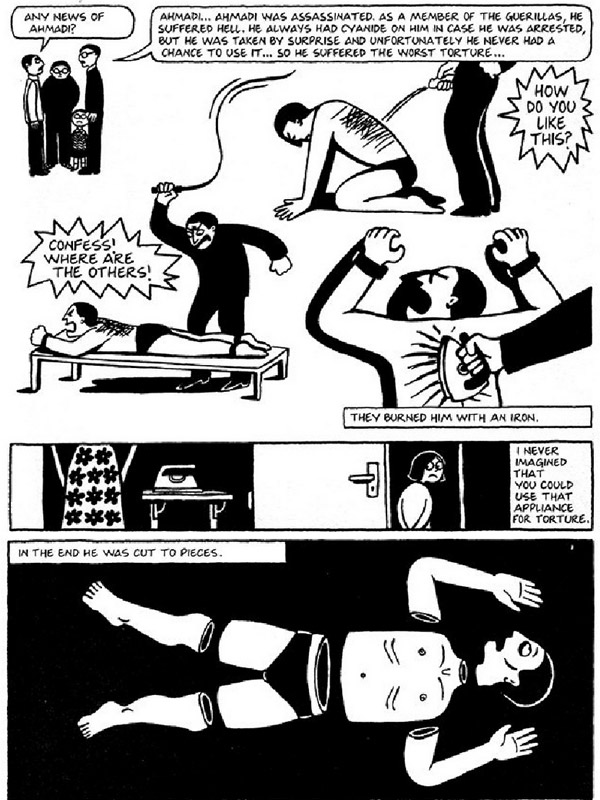My traditional Native American art career began and ended with my very first portrait: Stick Indian Taking a Piss in My Backyard.
As I circulated the original print around the classroom, Mrs. Schluter intercepted and confiscated my art.
Censorship, I might cry now. Freedom of expression, I would write in editorials to the tribal newspaper.
In third grade, though, I stood alone in the corner, faced the wall, and waited for the punishment to end.
I'm still waiting.
—Sherman Alexie, "Indian Education"
An odd story broke out last night about Marjane Satrapi's graphic novel Persepolis and Chicago Public Schools. I think it started on the blog CPS Chatter:
Also, censorship is alive and well and living in CPS. This letter went out to Lane Tech staff today letting him know that stories of women coming of age in the Iranian revolution are not appropriate materials regardless of what the Oscars say.
The letter was from the principal of Lane Tech, informing staff that a directive had been given during the March 11 Chief of Schools meeting that Persepolis was to be taken out of "all classrooms and the Library." Persepolis is an extraordinarily well-regarded comic novel, one of the greatest in the brief history of the form, and pulling it out of the library invoked the specter of censorship. People got upset quickly, and the word "ban" was invoked, which scares the crap out of people.
But then another e-mail went out: "A second email, sent from the principal later the same day, revised the previous directive, exempting removal from the library."
So it was a bit confusing. Now CPS says their only intention was to stop teaching it to 7th graders (it's in the 7th grade literary content framework with the intention of teaching the concept of identity, alongside Brent Staples's "Black Men and Public Space," one of my favorite essays, and Alexie's "Indian Education").
A spokeswoman for the district said district staff sent an email directing the books to be removed after teachers in the Austin-North Lawndale area raised concerns about the book. But she said the directive was not vetted, and didn’t reflect the district’s intent to simply stop 7th-graders from reading the book.
“The message got lost in translation, but the bottom line is, we never sent out a directive to ban the book. We want to make sure there’s an appropriate way to teach it to students given the graphic nature of the novel,” said spokeswoman Becky Carroll.
“We’re not saying remove these from buildings altogether,” she said.
So where it stands now is that it's okay for "juniors and seniors and for students in Advanced Placement classes." But, according to the official statement, "due to the powerful images of torture in the book, I have asked our Office of Teaching & Learning to develop professional development guidelines, so that teachers can be trained to present this strong but important content." Eighth through tenth grades are still up in the air.
It's been awhile since I read Persepolis; I got it for my mom, whom I'm not in the habit of giving particularly graphic graphic novels to (Ayako, or My Friend Dahmer, say, as good as they are; My Friend Dahmer would actually be a good high school teaching tool in some ways, because of its devastating and humane approach to alienation, bullying, and familial dysfunction, but I'm not waiting up).
There is torture and violence in it, but Satrapi's style is extremely austere, so the portrayal is more stark and haunting than vivid. Which can be just as, or more affecting; I saw Schindler's List on a school trip in sixth grade, and the scene that remained with me was not one of the more graphic ones, but that of ashes from a camp falling like snow.

There's more. But that's the worst, so to speak, of it. (I think the word "shit" is used once. If they get as far as Persepolis 2, there's some mild drug use and I guess what you'd call "adult themes.") It's chilling, but then again so's Shirley Jackson's "The Lottery," which ends—spoiler alert—with a woman getting stoned to death; it's also on the curriculum. There's also The Hunger Games, an excerpt from The Interrupters, and short texts on Trayvon Martin and Emmett Till, all of which deal with horrifying violence in their own ways.
I have some sympathy for CPS. It's difficult to figure out how and when to expose children to the horrors of existence (or expose parents to exposing their children to the horrors of existence, which is usually the problem). Yes: they've seen worse than Persepolis by the time they're 14, but educators are wary to turn the loss of innocence into a race with reality. At any rate, it's not a race they're going to win.
Persepolis strikes me as appropriate, because it's about coming into consciousness, and Satrapi is particularly gifted at capturing the flowering of her own awareness. But they're powerful images, and they frighten: adults sometimes more than children.


